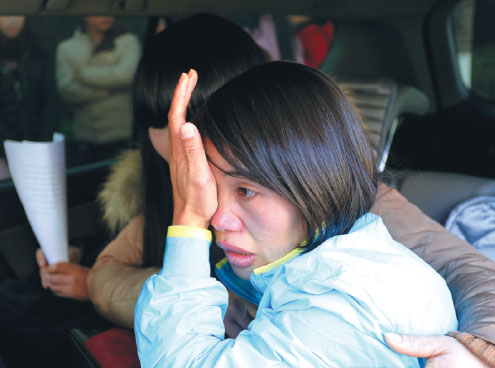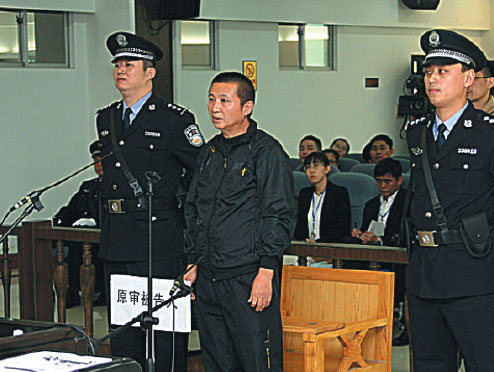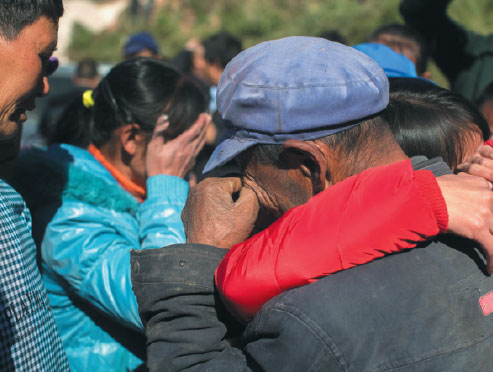Reforms aim to stop miscarriages of justice
Updated: 2016-02-23 13:32
By Cao Yin(China Daily USA)
|
||||||||
Changes to China's judicial system are designed to eradicate physical and psychological torture, coercion and other illegal methods of obtaining information and confessions. Cao Yin reports.
For many women, their 20s are the best years of their lives, as they hold down a decent job, fall in love or help to raise a family. For Qian Renfeng, her 20s were a struggle; she spent the entire decade in prison, serving time for a crime she did not commit.
"I lost my best years in prison, but thanks to efforts of my family members and lawyer, the slate was eventually wiped clean," said Qian, who was sentenced to life imprisonment when she was 17 after being wrongfully convicted of poisoning children.
On Dec 21, her conviction was quashed by the Yunnan Provincial High People's Court, 13 years after she was jailed. The court described the case against Qian, now 30, as "flawed".
Qian's case wasn't the only one to make headlines in December. Chen Man, who was given a suspended death sentence for murder and arson, stood trial a second time at a court in Hainan province in an attempt to prove his innocence after serving 16 years in jail. Chen's case is ongoing.
Both said they had provided false confessions after being tortured during interrogation.
According to Yuan Ningning, a legal researcher at Beijing Normal University, the use of torture was commonplace during interrogations in the 1980s and '90s, one of the main reasons for the high rate of miscarriages of justice during the closing decades of the last century.
"At that time, the police had little awareness of human rights protection; they pursued a high clear-up rate, and their investigative skills were inadequate," Yuan said.
He said violent interrogation has become rarer as China moves further along the road of rule of law, and the regulations to prevent coercion and torture have been strengthened since 2012, when the country's top leadership made revision of the legal process a top priority.
Since then, a series of measures has been introduced to eradicate torture, such as stronger judicial interpretations of what constitutes admissible evidence and a stipulation that all interviews must be recorded in their entirety, he said.
In 2014 alone, the revisions resulted in 778 convictions being overturned after evidence was ruled insufficient or inaccurate, according to a work report published by the Supreme People's Court, the nation's top court.
He Jiahong, a law professor at Renmin University of China who specializes in the study of evidence and its collection, said special attention should be paid to new forms of psychological torture, and regulations should be drawn up to ban them.
Technical improvements
Qian had mixed feelings when she walked out of the court in December. Although she was delighted to be free, her long absence from mainstream life had left her ill-equipped to deal with the modern world.
"The time in jail has made it a little difficult to get along with life today. For example, I don't know how to use a mobile phone," said the Zhaotong city native.
In 2002, Qian was sentenced to life imprisonment by the city's intermediate court after she was convicted of poisoning food at the kindergarten where she worked, causing the death of one child.
"When I was being interrogated, the police made me kneel for several hours to answer questions. I couldn't bear it, so I pleaded guilty. But my belief in the law made me, my family and my lawyer persist in lodging appeals," she added.
Qian's mother died in April, so her nephew, Qian Lunrong, is helping her to look for work in Kunming, the provincial capital, to help her family. "We believe that those who made mistakes in the case will be held responsible under the improved legal environment," he said.
Yang Zhu, a lawyer who has been working on Qian's case since 2010, said her conviction was quashed as a result of technical improvements in investigations and an increasing awareness of the protection of human rights.
"Ten or more years ago, the police regularly used torture when interrogating suspects because they were more reliant on oral confessions and their ability to collect evidence at the crime scene was inadequate," he said.
Now, though, interrogations are subject to strict regulations and torture has seldom been seen, especially in China's larger cities, since the government ruled that all interrogations must be recorded with audio and video, he said.
Yuan, the legal researcher, praised the government's determination to eradicate torture and said every step forward underlines the country's growing awareness of the importance of protecting human rights.
In 2012, the nation's top legislators highlighted the ban on torture in an amendment to the Chinese Criminal Procedure Law. A year later, the Supreme People's Court published a guideline under which courts were instructed to rule evidence inadmissible if it had been gained via improper methods, such as exposure to extreme cold, refusal to provide food or sleep-deprivation techniques.
In addition to the legal measures, improved investigative skills, such as the use of electronic devices to monitor and collect DNA evidence, have also contributed to improved evidence collection and helped to reduce the number of wrongful convictions, according to Renmin University's He.
A survey he conducted in 2007 showed that more than 90 percent of the 130 cases of wrongful conviction he studied were based on confessions obtained under duress. "However, our recent studies show that the problem has been alleviated greatly," he said.
Prosecutors should also be applauded, he said, because the improvement in interview techniques is partly the result of their improved supervision of evidence provided by the police. Meanwhile, the increasing role of judges, who handle cases independently, has also been crucial, he added.
"Ensuring that every judicial procedure is legal is an effective way of reducing the number of wrongful convictions, and will improve the nation's judicial credibility," he added.
'A hot, urgent issue'
He, who has spent more than 10 years studying cases of wrongful conviction, said that while physical torture, such as beating, has been brought under control, the police still use psychological coercion, such as sleep deprivation and threats, to obtain confessions.
"Judicial experts are studying ways to prevent and outlaw this type of mental torture; this is a hot, urgent issue in enforcing the rule of law," he said, adding that the legal definition of torture should be updated as soon as possible.
Yuan, the legal researcher, said the courts need to ensure that the records of interrogations provided by the police are accurate: "In some counties, the police only made a record after the suspects had confessed, or they only recorded certain parts of the confession."
Although he welcomed the moves to improve interrogation skills among officers, he warned that the police should avoid the practice prevalent in the United States, where suspects are often asked leading questions designed to prompt predetermined answers.
"Leading questions may result in false confessions that have the potential to bring about miscarriages of justice," said Yuan, who worked from 2012 to 2013 with The Innocence Project, a non-governmental organization in the United States founded to overturn miscarriages of justice and exonerate those who have been wrongfully convicted, especially via DNA evidence.
He urged similar organizations in China to make concerted joint efforts to eradicate torture and correct judicial mistakes.
Luo Yaping, a professor at the People's Public Security University of China who specializes in the study of investigative skills, said the police's ability to collect evidence at crime scenes has improved greatly, and most officers understand that the collection of legally admissible evidence is the key to reducing the number of miscarriages of justice.
"However, the lack of officers in grassroots police stations makes it hard for them to investigate cases, because the extra workload leaves little time for them to review their procedures and actions," she said.
"Investigation is the first step in dealing with a criminal case. If that first step is inadequate, the procedures that foll-ow will also be affected to a greater or lesser degree."
Contact the writer at caoyin@chinadaily.com.cn
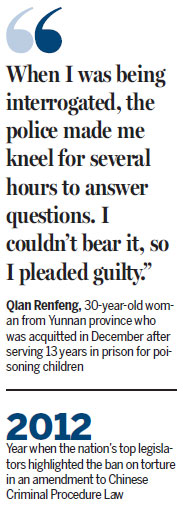
|
Qian Renfeng wipes away tears on Dec 21, the day her conviction was overturned by the Yunnan Provincial High People's Court. The 30-year-old was sentenced to life imprisonment 13 years ago after being wrongfully convicted of poisoning children. Photos provided to China Daily |
|
Chen Man, 52, during his retrial at a court in Hainan province on Dec 29. Chen is hoping to prove his innocence after serving 16 years in jail for murder and arson. |
|
Qian Renfeng hugs her father at her home in Nantuan village, Qiaojia county, Yunnan, on Dec 22, the day after her conviction was overturned by a local court. |
(China Daily USA 02/23/2016 page5)

 The world in photos: Feb 15 - 21
The world in photos: Feb 15 - 21
 China Daily weekly pictures: Feb 13-19
China Daily weekly pictures: Feb 13-19
 Lantern Festival in the Chinese paintings
Lantern Festival in the Chinese paintings
 Meet Melanie, the real-life mermaid
Meet Melanie, the real-life mermaid
 Samsung unveils new products at mobile conference in Spain
Samsung unveils new products at mobile conference in Spain
 88th Academy Awards Governors Ball Press Preview
88th Academy Awards Governors Ball Press Preview
 Chinese photographers' work shines in major photo contest
Chinese photographers' work shines in major photo contest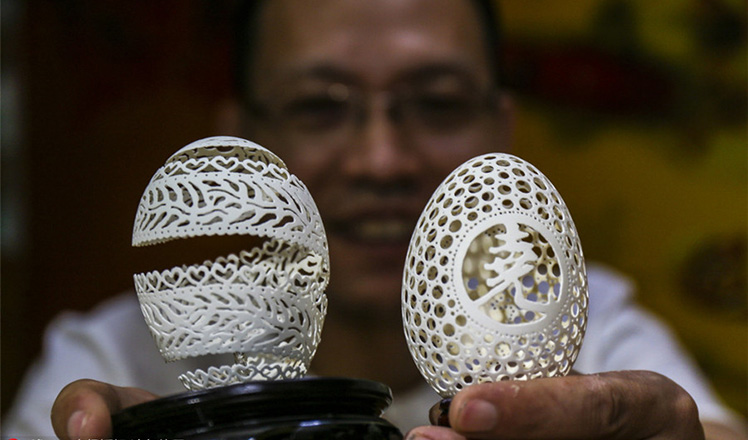
 Egg carving master challenges Guinness World Record
Egg carving master challenges Guinness World Record
Most Viewed
Editor's Picks

|

|

|

|

|

|
Today's Top News
What ends Jeb Bush's White House hopes
Investigation for Nicolas's campaign
Will US-ASEAN meeting be good for region?
Accentuate the positive in Sino-US relations
Dangerous games on peninsula will have no winner
National Art Museum showing 400 puppets in new exhibition
Finest Chinese porcelains expected to fetch over $28 million
Monkey portraits by Chinese ink painting masters
US Weekly

|

|
